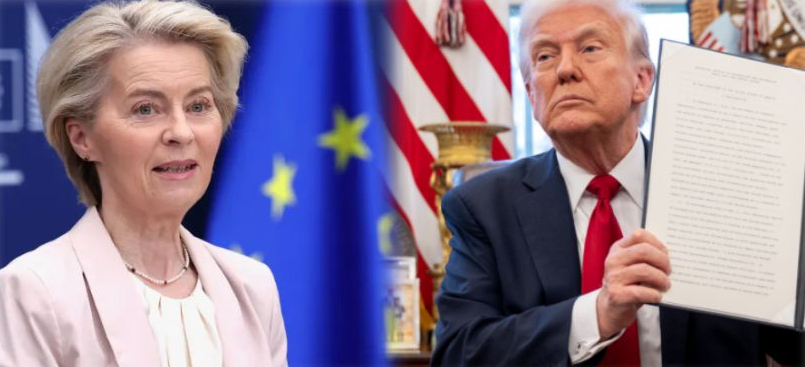
On May 25, local time, US President Trump announced on social media that he agreed to the EU's request to postpone the plan to impose a 50% tariff on EU goods originally scheduled for June 1 to July 9. This decision temporarily eased the global market's concerns about the escalation of the trade war, but it also reflected the complex game of US-EU trade relations and the uncertainty of the global economy.
Trump's concession this time is not accidental. As the second largest trading partner of the United States, the EU's bilateral trade volume in 2024 will exceed 800 billion euros, and the US trade deficit with the EU will reach 198.2 billion euros. European Commission President von der Leyen emphasized the statement of "quickly advancing negotiations", suggesting that the EU is ready to compromise. Trump's core demand - reducing the trade deficit, and the EU's purchase of $350 billion in US energy, have become the key to the negotiations. Faced with Trump's "tariff blackmail", the EU is unwilling to succumb to unilateral pressure, but also needs to avoid the vicious cycle of port congestion (such as the 77% surge in waiting time at Bremen Port) and supply chain disruptions. The extension provides both sides with breathing space: the EU can accelerate the adjustment of its energy procurement strategy, while Trump can use this opportunity to showcase the results of the negotiations and accumulate bargaining chips for the November mid-term elections.
Trump's tariff threat is essentially a "war to promote peace" strategy. Its core logic is to use tariff leverage to force the EU to make concessions in areas such as energy and manufacturing. However, this move faces multiple obstacles: US Treasury Secretary Yellen warned that high tariffs will push up inflation and damage the economy; the EU has launched phased countermeasures and plans to impose retaliatory tariffs on US goods worth 21 billion euros (covering soybeans, automobiles, etc.), directly targeting the interests of the Republican "deep red states". In addition, the EU is brewing new sanctions against US technology giants to form a "tit-for-tat" deterrence. This game has gone beyond the simple trade field and has become a contest of transatlantic political forces - the Republican Party's dominance in Congress and Europe's tolerance threshold for US unilateralism have become hidden variables in the tariff extension.
The pending tariffs have caused supply chain shocks. Delays at major European ports have intensified, and waiting times at hubs such as Rotterdam and Hamburg have lengthened, indicating that rising transportation costs will affect Asia and the United States. If tariffs are finally implemented, the cost pressure of the affected goods (about 70% of EU exports to the United States, worth 382 billion euros) will be transmitted along the industrial chain: German manufacturing exports will be blocked, American consumers will face price increases, and multinational companies will be forced to restructure their supply chains. This "lose-lose" risk has forced both sides to return to the negotiating table, but it has also exposed the vulnerability of the globalized system under the impact of trade protectionism.
The July 9 negotiation deadline is full of variables. Trump needs to balance electoral politics and economic realities: if the EU purchases a large amount of energy, tariffs may be partially lifted; if the negotiations fail, the trade war will escalate into a "protracted war." The EU faces a dilemma: short-term concessions can avoid tariff shocks, and long-term dependence on US energy may weaken strategic autonomy. The deeper contradiction lies in the fundamental conflict between the Trump administration's "America First" policy and the EU's multilateral trading system, which is difficult to resolve through a single negotiation.
Trump's decision to postpone tariffs is a phased compromise in the US-EU trade game, not a structural solution. The global market still needs to wait for the answer on July 9 amid uncertainty: how this transatlantic economic struggle will ultimately reshape the trade landscape will test the wisdom and resilience of both sides.

On January 4th local time, Trump warned India that if it does not limit its purchase of Russian oil, the United States will continue to raise tariffs on Indian products. Trump's latest warning sent shockwaves through the Indian financial market in just one day.
On January 4th local time, Trump warned India that if it do…
In October 2025, the US trade deficit narrowed unexpectedly…
According to the British media CoinJournal, recently, due t…
In January 2026, US President Trump once again set his sigh…
Europe is facing a crucial strategic choice: In the face of…
On New Year's Day 2026, BMW China announced a "systematic v…